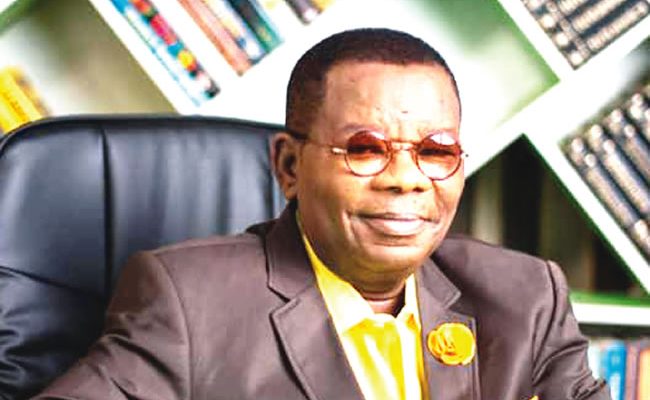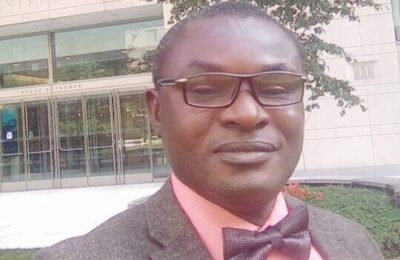Former Secretary to the State Government (SSG), in Ondo State, Dr. Aderotimi Adelola, in this interview granted Akin Adewakun, reminisces on his eight-year tenure as the state’s SSG, relationship with his former principal, Dr. Olusegun Mimiko; and reasons for his new book, among others.
Don’t you think it’s rather late in the day to write a book on former Governor Olusegun Mimiko’s administration, eight years after leaving office, as SSG?
It is not too late that l am just coming out with this book eight years after l left office as SSG. Scientists have proven that time is an illusion created by the human mind. For example, Albert Einstein espoused that “…the distinction between past, present, and future is only a stubbornly persistent illusion”. This has been corroborated by Abnijit Naskar, an author and a celebrated neuroscientist that “…time is a virtual perception of the past, present, and the future based on all our experiences. There is no actual existence of the past and the future. All that there is, is the present.” Therefore, this moment is the season, the perfectly normal time for me to write this book.

What informed your decision, then?
My motivation for writing this book is historical documentation; to share my knowledge and insights, and to pass the inherent lessons to current and aspiring political leaders, elected public servants, as well as political appointees at all levels of governance. Moreover, it was an index of personal fulfillment as l pursued the book writing project, exploring my creativity, and enjoying the process of writing and storytelling.

What do you intend to achieve with the book?
The Mimiko administration was the first democratic government to operate for two uninterrupted terms since the creation of Ondo State. I am also the longest-serving SSG in Ondo State. The story is worthy of being told by me, a person who worked closely with the governor. For one thing, the philosophical orientation of Governor Mimiko, his leadership tendency, and his vision-driven approach to governance are worthy of emulation by current and aspiring Governors and other elected and appointed political office holders. What l have done in this book: “Working Under the Sunshine: Reminiscences on How a State Government in Nigeria Created Values for the People”, decently reveals the underbelly of the Mimiko administration, the strategies, the challenges, and decisions, and to set the record straight about the administration by providing an accurate account of historical events, and correct misconceptions. It is a historical documentation that provides an account of significant events and decisions in government. It gives a detailed account of how the Ondo State government was reinvented by Dr. Mimiko during his tenure: the mechanics of a customer-driven and outcome-oriented state governance model; strategic civil service reforms, and the motivational schemes deployed to make all civil servants and political appointees focus their eyes on the ball to achieve positively- impactful outcomes for the people.
There is a general, albeit unacceptable, tendency by analysts of government performance to focus attention on the national level and attempt to extrapolate such analysis to the entire nation. This is, of course, with thoughtless disregard for any success stories at the sub-national levels. This book, therefore, reveals the inspiring and emulatable success secrets and principles of a state government in Nigeria, focusing on how a customer-driven and outcome-oriented governance model created sustainable values for the masses.
And you believe you have the necessary credentials to undertake the task of writing a book that seems to be a compendium of the activities of the Mimiko administration?
Why not? l am eminently qualified to write a book on the strategies, decisions, challenges, and phenomenal achievements of the Mimiko administration. Remember I was the Director of Organisation of the Ondo Study Group, created in 1987 with Dr. Olusegun Mimiko as the Chairman. My membership in the Ondo Study Group afforded me an insight into the extraordinary leadership capability of Dr. Mimiko. I was also a keen non-participant observer of his political adventure. This background knowledge is content for storytelling. Furthermore, as SSG, my office was the ‘brainbox’ of government; and as an active participant in policy formulation, implementation, and evaluation, l had a drone’s perspective of the process of governance and this creates another content for storytelling.
But how do you counter some who may see the book as another effort by an ex-government official to justify some failed policies or projects?
There wasn’t any failed project in the Mimiko administration. The administration initiated and implemented the Abiye Safe Motherhood project, the Agbebiye Scheme, the Trauma Centre, the Cocoa Revolution, Strategic Urban Renewal, bottom-up rural community development, Agro-Business Cities, Mega Schools, Independent Power plant, Free Trade zone, School Shuttle for students statewide, Kaadi Igbeayo, COMESERVE and the associated reforms in the civil service, among other human and society development projects. These projects were applauded by local and international organisations such as the World Bank, UN-Habitat, World Health Organisation, and the Development Agenda for Western Nigeria. For instance, the Abiye and Agbebiye projects resulted in a significant reduction in maternal and infant mortality. The integrated and interactive approach of the Mimiko administration to rural community development was predicated on the commitment to narrow the age-long gap between the government and rural community dwellers who had lost confidence in government as a result of failed, unfulfilled, and abandoned projects. The bottom-up strategy of the Mimiko administration tagged ‘kajose kajola’ was inclusive asit involved residents of rural communities in identifying, designing, planning, and implementing community development projects. In all, more than 663 projects were completed in collaboration with residents of 350 rural communities who developed a strong sense of ownership of the projects.
But, if they were that laudable, why did the Aketi administration jettison most of the legacy projects, due to their non-sustainability, as claimed by some critics?
The administration of Governor Rotimi Akeredolu, of blessed memory, implemented some of the developmental projects inherited as work-in-progress from the Mimiko administration. The succeeding Governor Lucky Aiyedatiwa’s government is still implementing some of the inherited projects in addition to the ones his government initiated. For instance, the late governor worked assiduously to obtain approval for a deep sea port in the riverine South Senatorial district of the State. Dr. Mimiko handed over the deep sea project in his handing-over note. Similarly, Aketi’s government followed up strategically on the utilisation of the Ore Independent Power Plant by inviting some industrialists to commence operation at the adjoining industrial park for which the 60mw power plant was constructed by the Mimiko administration.
However, there are other projects the late Governor Akeredolu, SAN did not follow up with continuing implementation. I have in mind the world-acclaimed Abiye Safe Motherhood project and its foundational Mother and Child Hospitals; the state-wide school shuttle for students, the Mega Schools, the bottom-up rural community development, urban renewal projects, positioning of the Medical Village as a centre for medical tourism, the Idanre Hills Tourism project, and so on.
Of course, a succeeding civilian administration may not continue the implementation of projects inherited from a preceding administration. Differences in ideological orientation are a strong factor here.
Be that as it may, the governments of the late Arakunrin Akeredolu, SAN, and his successor Governor Aiyedatiwa initiated, and are still initiating and implementing many applaudable developmental projects in Ondo State, and such projects are contributing immensely to the socio-economic and cultural development of the State.
But what would you say prepared you for the SSG job; since your forte wasn’t really public service, prior to the appointment?
As an organisational psychologist who had served in various senior executive positions in the manufacturing, financial services, and oil and gas sectors, I had the preparation, professionally and experientially, to manage the activities of any complex human formation like the secretariat of a state government. Hence, l invested the best of my intellectual, spiritual, emotional, and physical resources to my role as SSG in obedience to the Biblical injunction in Ecclesiastes 9:10 that “whatsoever thy hand findeth to do, do it with thy might…”
In addition, l worked SMART. I made sure that l had a full understanding of what the governor expected of me and my office. During my first official meeting with the governor, himself a former SSG, l deliberately asked him to educate me on my duties and responsibilities as SSG and the areas in which he expected specific results within a timeline. In his response, Dr. Olusegun Mimiko took time to explain my role as SSG, his vision, mission, and commitment to social democracy as a guiding philosophy in crafting his strategy, policies, decisions, and actions. I can remember vividly his words that “our business in governance is to understand that government policies and activities should be about the people, their socio-economic wellbeing, their health, irrespective of socio-economic status. We must strive at all times to make and implement decisions that will benefit the greatest number of people. And my goal is to provide enlightened, selfless, and committed leadership for our people.” He stated clearly my core responsibilities as SSG were to work closely with him to drive policy formulation, harmonisation, implementation, and evaluation to achieve specific and measurable outcomes for the people.
What’s your relationship with Dr. Mimiko like now?
l maintain a very cordial relationship with him. He even read through the draft manuscript of my book and made a unique contribution that has enhanced the quality of the book, dedicated to him, and his subscription to the timeless truism that knowledge is power when applied to the transformation of individuals and societies.
READ ALSO: Tithe: ‘It takes humility to apologise’, Mike Bamiloye defends Adeboye







